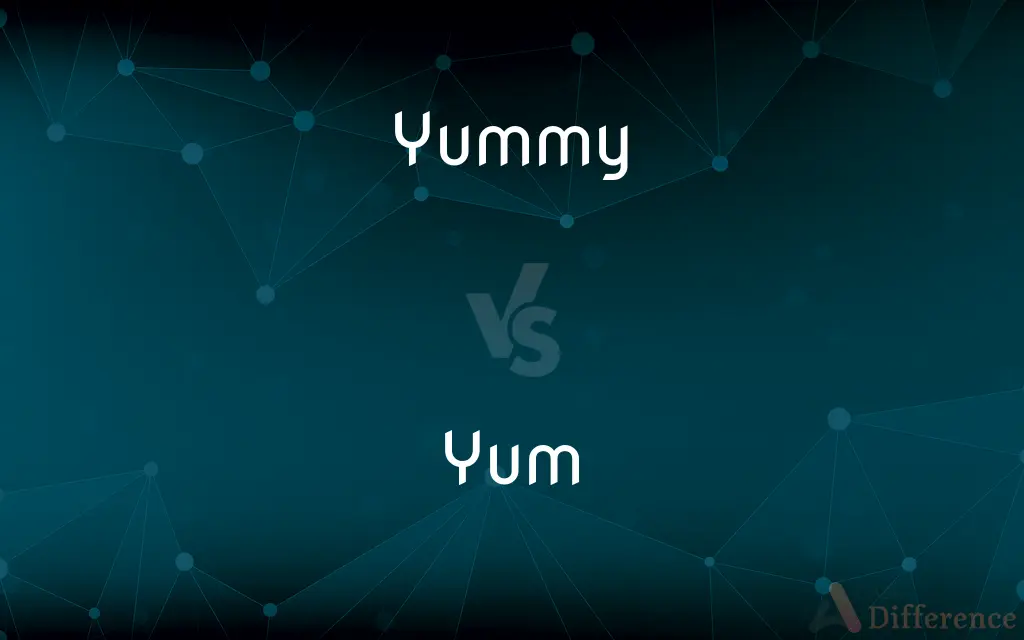Yummy vs. Yum — What's the Difference?
By Maham Liaqat & Urooj Arif — Updated on April 16, 2024
"Yummy" describes a delicious taste or enjoyable eating experience, whereas "yum" is an exclamation expressing pleasure in eating.

Difference Between Yummy and Yum
Table of Contents
ADVERTISEMENT
Key Differences
"Yummy" is an adjective used to describe something that tastes very good or is highly enjoyable, particularly in the context of food. It is often used to express that something is appetizing or has a pleasant flavor. On the other hand, "yum" is an interjection used to express pleasure or satisfaction in response to tasting something delicious. It is a more immediate and spontaneous expression compared to "yummy."
While "yummy" can be applied to describe a range of things from the taste of food to the appealing nature of non-edible items in a metaphorical sense, "yum" is specifically targeted at the act of tasting. It's seldom used beyond the context of eating or drinking, making its application more limited.
"Yummy" is often used in a more formal or descriptive sense to communicate a broad approval of taste or quality, such as in reviews or recommendations. "Yum," on the other hand, is typically casual and used in informal speech or written dialogue, capturing a momentary reaction to something tasty.
In advertising or marketing, "yummy" is preferred for its descriptive quality that can enhance the appeal of food products or recipes. Whereas "yum" might be featured in more dynamic, spontaneous contexts, like in social media captions or in verbal reactions within commercials.
Both "yummy" and "yum" are expressions of enjoyment related to food, but "yummy" provides a descriptive quality that "yum" does not. "Yum" serves more as an instinctual exclamation that might be heard in everyday conversation or seen in text messages.
ADVERTISEMENT
Comparison Chart
Part of Speech
Adjective
Interjection
Usage
Describes tastiness
Exclaims tastiness
Context
Formal and informal
Primarily informal
Scope
Broad descriptive use
Narrow, spontaneous use
Expressiveness
Descriptive quality
Immediate, spontaneous reaction
Compare with Definitions
Yummy
Delicious and pleasing to taste.
The chocolate cake was so yummy I had to have another slice.
Yum
A simple reaction to delicious tastes.
He took one bite of the burger and exclaimed, Yum!
Yummy
A term often used to describe kid-friendly food that is both healthy and tasty.
I try to make yummy meals that even my kids will love.
Yum
An exclamation indicating tasty food.
Yum! This pizza is amazing!
Yummy
Highly satisfying or appealing, especially to the senses.
They sell some really yummy scented candles at the boutique.
Yum
Used to express pleasure derived from food.
Yum, I love how creamy this ice cream is!
Yummy
Attractively good or desirable, often used in informal contexts.
Look at these yummy desserts on the menu.
Yum
Can be used as playful commentary in food-related discussions.
We're having sushi tonight? Yum!
Yummy
Enjoyable and pleasant to experience.
What a yummy day for a picnic!
Yum
Often used in informal speech to show enthusiasm about food.
Yum! I could eat this all day!
Yummy
Very pleasing to the taste or smell; delicious.
Yum
Used to express appreciation of or eagerness for a tasty food or beverage.
Yummy
Very pleasant or attractive.
Yum
Used to express appreciation for something attractive or to express eagerness for a pleasurable experience.
Yummy
Delicious.
Yummy
(slang) yummy mummy
Yummy
Very pleasing or attractive; especially, pleasing to the taste; delicious; scrumptious.
Yummy
Extremely pleasing to the sense of taste
Common Curiosities
What type of word is "yummy"?
"Yummy" is an adjective.
Is "yum" a complete sentence?
In casual conversation, "yum" can stand alone as a complete expression of satisfaction.
In what context can "yum" be used?
"Yum" is used as an exclamation in informal settings.
Is "yum" appropriate for business or academic writing?
"Yum" is generally too informal for business or academic contexts.
How do "yummy" and "yum" relate to the sense of taste?
Both words relate to experiencing pleasurable tastes, with "yummy" being descriptive and "yum" being exclamatory.
What is the typical reaction when someone says "yum"?
It indicates immediate pleasure from tasting something delicious.
Can "yummy" describe things other than food?
Yes, "yummy" can metaphorically describe anything appealing.
Can "yummy" be used in formal writing?
While less common, "yummy" can appear in more casual formal writing.
How does the use of "yum" affect the tone of a conversation?
It makes the tone more lively and enthusiastic.
How do children typically use "yummy"?
Children often use "yummy" to describe foods they like.
Is "yummy" used worldwide?
Yes, "yummy" is widely understood across different cultures.
Are there any synonyms for "yummy"?
Synonyms include delicious, tasty, and scrumptious.
What does "yum" convey that "yummy" does not?
"Yum" conveys an instant, spontaneous reaction.
Can "yum" be used to describe a drink?
Yes, it can be used for any tasty beverage.
Share Your Discovery

Previous Comparison
Ireland vs. Iceland
Next Comparison
Shipment vs. CargoAuthor Spotlight
Written by
Maham LiaqatCo-written by
Urooj ArifUrooj is a skilled content writer at Ask Difference, known for her exceptional ability to simplify complex topics into engaging and informative content. With a passion for research and a flair for clear, concise writing, she consistently delivers articles that resonate with our diverse audience.













































